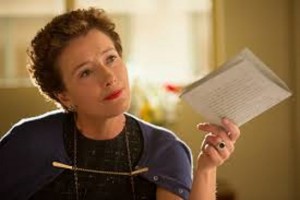The story of Mary Poppins author Pamela Travers, or P.L. Travers, as told in Saving Mr. Banks (2013), is not only about her reluctance to part with her children’s book Mary Poppins, but about why she wrote it in the first place.
In that vein, Saving Mr. Banks shares a lesson about experience.
For two weeks in the 1960s, Travers goes to Hollywood to oversee how her book would be made into a film. The film will be made if she agrees to sign away her rights.
As Travers struggles to let filmmakers produce her book, there are several childhood moments that build and build until there is a point to it.
Episodes in Travers young life, at turn of the century Australia, are told in flashback and unfold to explain why the book Mary Poppins was conceived.
Sometimes people never come to terms with ‘incidents of childhood’ though incidents can shape adult identity.
Travers (played by young Australian actress Annie Rose Buckley) looks up to her father as most children would look up to their fathers. Children can so idolize their parents, but when adults fail to measure up, children are shocked and dismayed, which can have a life altering effect. Travers Goff (Collin Farrell) is a banker, and tries to be a good father, but he has his problems.
But there is hope when we understand something vital that is life changing: parents have problems, too.
Knowing this can release adults, who were once children that idolized their parents. With people, human is what you get. Knowing this can liberate the person expecting more.

